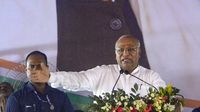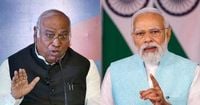On May 6, 2025, Congress President Mallikarjun Kharge made serious allegations against Prime Minister Narendra Modi regarding an intelligence failure that preceded the tragic Pahalgam terror attack in Jammu and Kashmir. Speaking at a rally in Ranchi, Kharge claimed that Modi had received an intelligence report three days prior to the attack, which prompted him to cancel his scheduled visit to Kashmir.
Kharge's assertions have raised questions about the government's preparedness and response to potential threats in the region. "I read in newspapers that three days before the attack, an intelligence report was sent to PM Modi. Therefore, he cancelled his Kashmir visit. When intelligence agencies told you it would not be appropriate to go, why did you not share this intelligence with police and security forces?" he asked, highlighting the perceived negligence in ensuring the safety of civilians and tourists.
The Pahalgam attack occurred on April 22, 2025, resulting in the deaths of 26 individuals, mostly tourists. The attack has been described as horrific, and Kharge emphasized the need for accountability from the government. "There was a horrific terrorist attack on 22 (April)...26 innocents were killed. The government admitted there was an intelligence failure. Why did you not arrange for tourists' security?" he questioned, pointing to a significant lapse in security measures.
Kharge's comments come amid ongoing tensions between the Congress party and the ruling Bharatiya Janata Party (BJP), particularly concerning national security issues. The Congress party has faced criticism for its stance on various matters, with Kharge's recent remarks adding fuel to the fire. The BJP has characterized Kharge's statements as treacherous, with spokesperson CR Kesavan labeling him a "modern-day Mir Jafar," a reference to historical betrayal. Kesavan demanded that Kharge provide evidence for his claims or issue an unconditional apology.
In his address, Kharge also reiterated the Congress party's support for any decisive actions the government may take against Pakistan in response to the attack. "We have already stated that whatever strong decisions the government takes against Pakistan in the fight against terrorism, we will stand with the government. Because this is a matter of national security. The country comes first; everything else is secondary," he stated, emphasizing the need for a united front in the face of terrorism.
Furthermore, Kharge questioned the government's decision-making process in light of the intelligence report. He stated, "If intelligence could warn that it wasn't safe for you (the PM) to go there, why didn't you take proper steps to protect the tourists and civilians?" His remarks highlight a critical perspective on the government's handling of security in a region known for its volatility.
As the political landscape continues to evolve in India, the fallout from the Pahalgam attack and the subsequent allegations against Prime Minister Modi will likely remain a focal point of discussion. The Congress party's insistence on accountability and transparency in security matters resonates with many citizens concerned about the safety of tourists and locals in conflict-prone areas.
In the wake of the attack, the Indian government has announced several punitive measures against Pakistan, including the suspension of the Indus Waters Treaty, which governs the flow of the Indus River and its tributaries. This move indicates a significant escalation in diplomatic tensions between the two nations.
On April 23, the Cabinet Committee on Security (CCS) convened to discuss the Pahalgam attack and review the intelligence failures that preceded it. Reports indicate that the Intelligence Bureau (IB) had alerted local security forces about the possibility of an attack targeting tourists around the time of Modi's scheduled visit to the region on April 19. However, the Prime Minister's trip was canceled due to bad weather, and the attack occurred in Pahalgam, approximately 90 kilometers away from Srinagar.
As the investigation into the attack unfolds, questions remain regarding the adequacy of security measures in place at the time. Kharge's insistence on accountability raises pertinent issues about the government's preparedness and response capabilities in the face of imminent threats.
In conclusion, the Pahalgam terror attack has not only resulted in tragic loss of life but has also sparked a political firestorm in India. With allegations of intelligence failure and calls for accountability echoing through the political arena, the ramifications of this incident will likely influence the upcoming political discourse and shape the narrative surrounding national security in the country.





